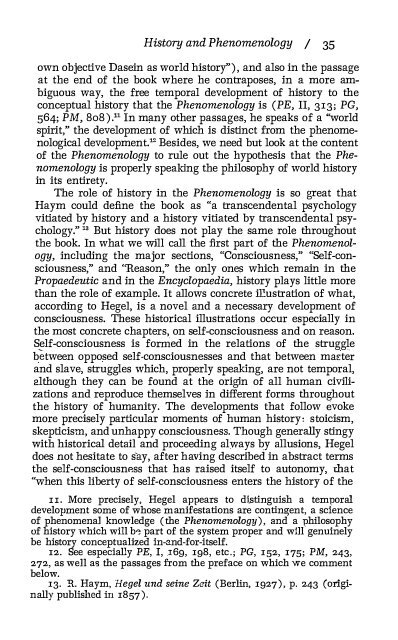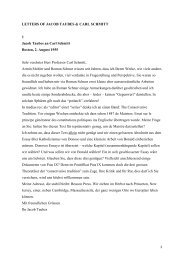selection one - Sound and Signifier
selection one - Sound and Signifier
selection one - Sound and Signifier
Create successful ePaper yourself
Turn your PDF publications into a flip-book with our unique Google optimized e-Paper software.
History <strong>and</strong> Phenomenology / 35<br />
own objective Dasein as world history"), <strong>and</strong> also in the passage<br />
at the end of the book where he contraposes, in a more ambiguous<br />
way, the free temporal development of history to the<br />
conceptual history that the Phenomenology is (PE, II, 313; PG,<br />
564; PM, 808).11 In many other passages, he speaks of a "world<br />
spirit," the development of which is distinct from the phenomenological<br />
development.1.2 Besides, we need but look at the content<br />
of the Phenomenology to rule out the hypothesis that the Phenomenology<br />
is properly speaking the philosophy of world history<br />
in its entirety.<br />
The role of history in the Phenomenology is so great that<br />
Haym could define the book as "a transcendental psychology<br />
vitiated by history <strong>and</strong> a history vitiated by transcendental psychology."<br />
13 But history does not play the same role throughout<br />
the book. In what we will call the first part of the Phenomenology,<br />
including the major sections, "Consciousness," "Self-consciousness,"<br />
<strong>and</strong> "Reason," the only <strong>one</strong>$ which remain in the<br />
Propaedeutic <strong>and</strong> in the Encyclopaedia, history plays little more<br />
than the role of example. It allows concrete ir.ustration of what,<br />
according to Hegel, is a novel <strong>and</strong> a necessary development of<br />
consciousness. These historical illustrations occur especially in<br />
the most concrete chapters, on self-consciousness <strong>and</strong> on reason.<br />
Self-consciousness is fornied in the relations of the struggle<br />
b e tween opposed self-consciousnesses <strong>and</strong> that between mm::t e r<br />
<strong>and</strong> slave, struggles which, properly speaking, are not temporal,<br />
clthough they can be found at the origin of all human civilizations<br />
<strong>and</strong> reproduce themselves in different forms throughout<br />
the history of humanity. The developments that follow evoke<br />
more precisely particular moments of human history : stoicism,<br />
skepticism, <strong>and</strong> unhappy consciousness. Though generally stingy<br />
with historical detail <strong>and</strong> proceeding always by allusions, Hegel<br />
does not hesitate to say, after having described in abstract terms<br />
the self-consciousnAss that has raised itself to autonomy, mat<br />
"when this liberty of self-consciousness enters the history of the<br />
II. More precisely, Hegel appears to dtstinguish a temporal<br />
development some of whose manifestations are continent, a science<br />
of phenomena] knowledge (the Phenomenology), <strong>and</strong> a philosophy<br />
of history which will b part of the system proper <strong>and</strong> will genuinely<br />
be history conceptualized in-<strong>and</strong>-for-itself.<br />
12. See especially PE, I, 16g, 198, etc.; PG, 152, 175; PM, 243,<br />
272, as well as the passages from the preface on which we comment<br />
below.<br />
13. R. Haym, Hegel und seine Zeit (Berlin, 1927), p. 243 (originally<br />
published in 1857)·




